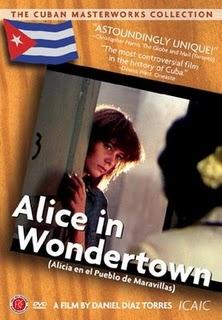Alicia en el Pueblo de Maravillas (Alice in Wondertown)

As Alice in Wondertown begins, a sense of foreboding emanates from the screen. Alice is running along a beach, away from an invisible threat, and her ill-fitting boots are impeding her progress. She makes it to the main road, screaming to a truck full of workers for help. After what seems like a full minute of Alice screaming, the truck finally screeches to a halt and the occupants acknowledge the distressed woman in the street. Alice gratefully hops aboard the back of the truck.
As the truck begins to roll along again, a tall, hooded figure rises above the rest of the passengers and again Alice is sent into a screaming panic. With a look that can only be described as sheer mania, Alice rises to face the figure walking towards her and, in one swift movement, causes it to be thrown from the truck and off the bridge the truck is crossing. Later, investigators from the Cuban government scouring the crime scene can find no body, no clothing, and no evidence of a body having fallen from a 100-foot bridge to the grass below.
This scene can be considered a metaphor for how the rest of movie seems to work. There is always a form of tension or distress looming in the distance, but it is hard to explain how much of this distress and the resulting actions are actual or merely perceived by the protagonist, Alice. Much like Lewis Carroll’s Alice's Adventures in Wonderland, the film straddles the line between the sane and the absurd, and absurdity seems to win out in the end.
The film is set in the small town of Maravillas, where Alice becomes a drama teacher after leaving her office job, and her lover Serafin. The night of her arrival, Alice settles into her roach infested hostel room and rips down a poster describing the virtues of hard work. While at the sink in the bathroom, she opens up the mirror to find that, rather than seeing a medicine cabinet, she is facing Omar Rodriguez, who will become her companion and defender throughout the film. They greet one another and partake in momentary small talk. Omar has a face full of shaving cream and Alice is still getting over the shock of finding a person in her medicine cabinet, so they say goodnight. Omar leaves her by saying, “Maravillas loves the theater, it’s in the blood.”
Throughout her days in Maravillas, a vision of Serafin repeatedly appears to Alice. He calls her naïve and tries to persuade her to return to her old life. She ignores his pleas, saying that she has no troubles in Maravillas and would like to stay. However, she never offers Serafin or viewers a reason as to why she decided to go to Maravillas in the first place.
Alice faces resistance and anger from town residents as she attempts to modernize their annual play. A rabid debate ensues over whether learning history is more important than creating change. Alice argues in favor of change, saying that it will make the play more interesting and more enjoyable for everyone involved. This assertion causes some of the Maravillans to become frenzied with anger, and Alice must leave the play rehearsal quickly.
After the tumultuous and non-sensical play rehearsal, Alice begins to become of aware of the many strange and backwards seeming sights, people, and situations that she sees daily in Maravillas. Sitting on a bench in the scorching Cuban sun, Alice confides in Omar that she has the desire to write about the strange stories of Maravillas. She is in disbelief that no one has published the ridiculous stories of the place already. Omar, who was always staunchly in support of Alice’s progressive ideas, now tells her that she is naïve. A loudspeaker vomits as he says these words. The distinction between reality and illusion is now completely non-existent.
Alice in Wondertown is worth seeing if for no other reason than to view a Cuban film that reflects the rich culture and struggle of this nation. After the movie set attendance records when it was initially released in 1991, the Cuban government stopped showing it on the grounds of indecency and absurdity. While the film is full of political observations masked in absurdity—like Alice’s closing moral, “You’ll never get far with fizzy water that you have to shake”—it offers a strong female protagonist and a cast of truly unforgettable characters. Are the political and artistic illusions in the film symbolic or merely 'theater'? That’s up to you to decide.
It is! Worth a view. I found it at the library and happy to gain a glimpse of a perspective on life in Cuba.
That looks like an interesting film.